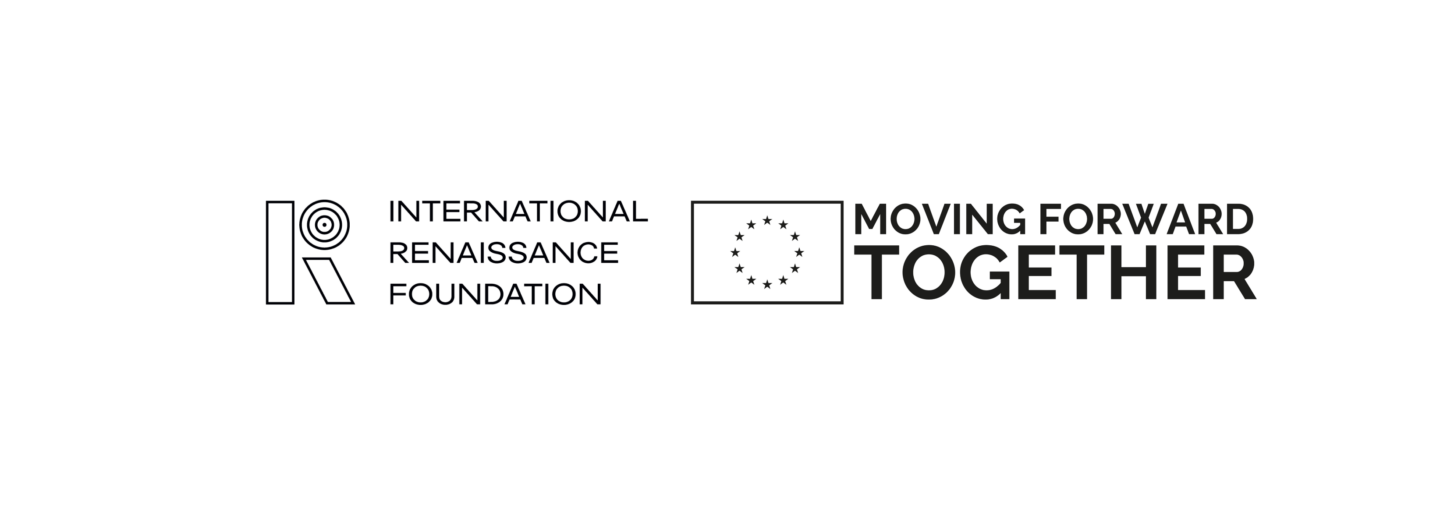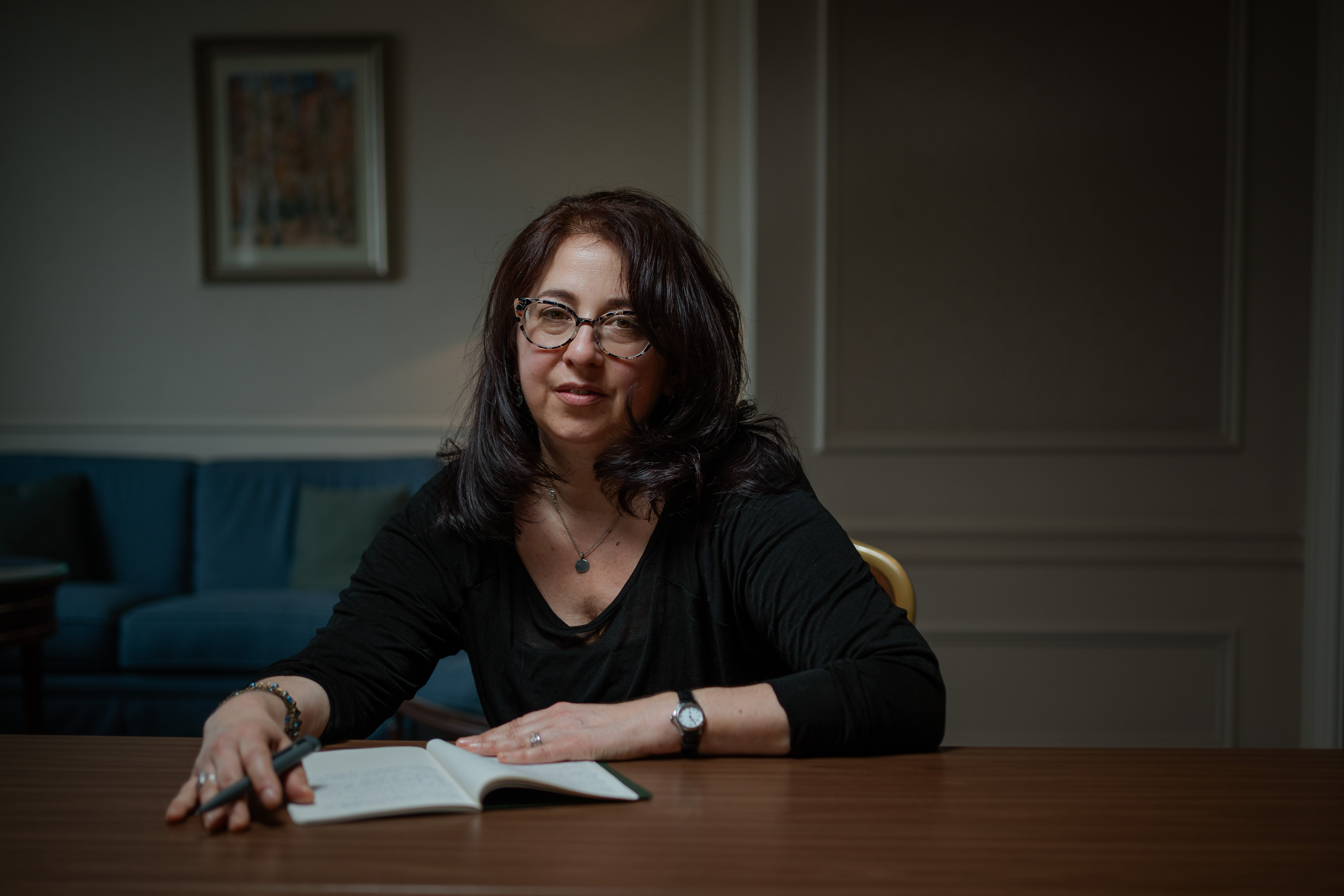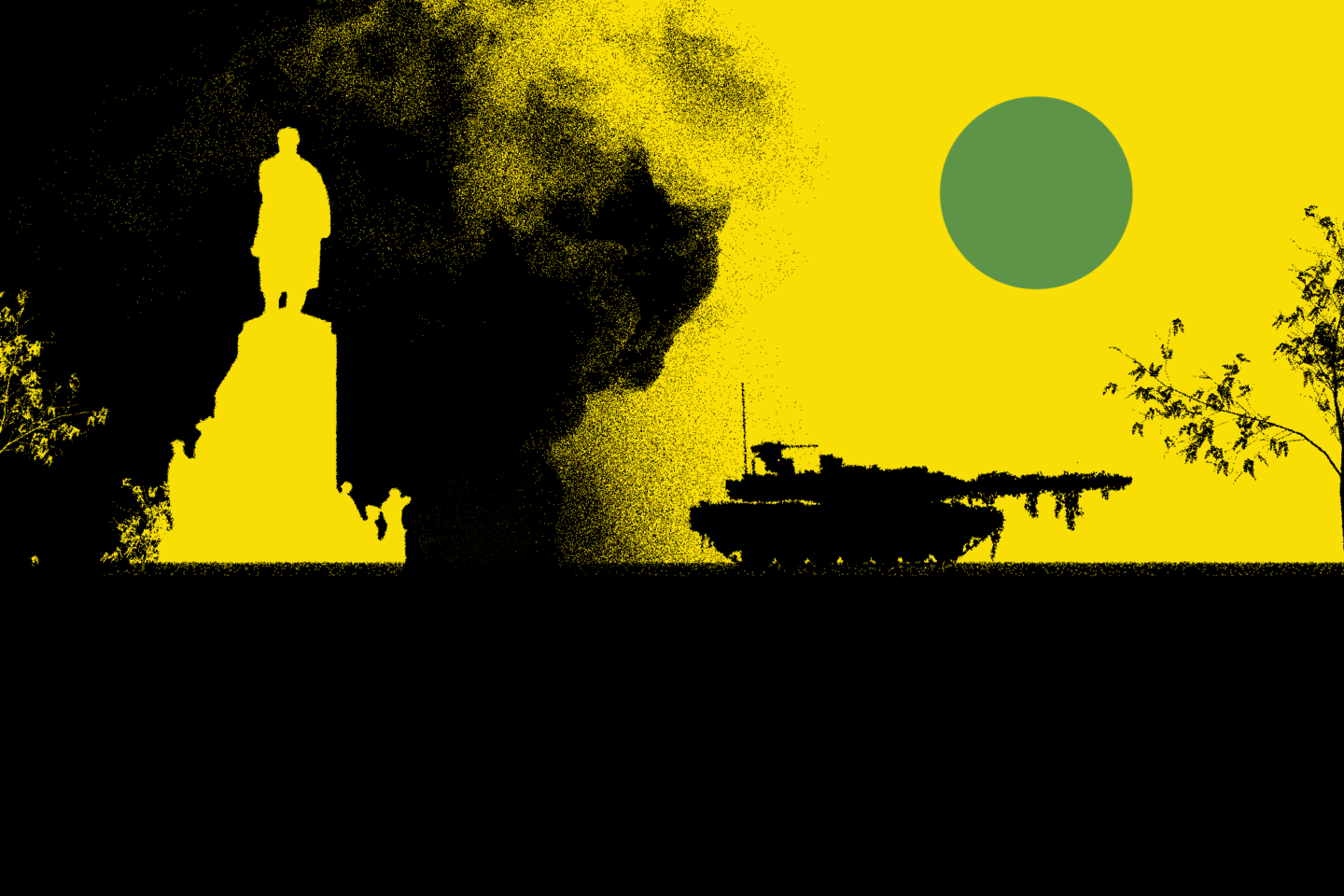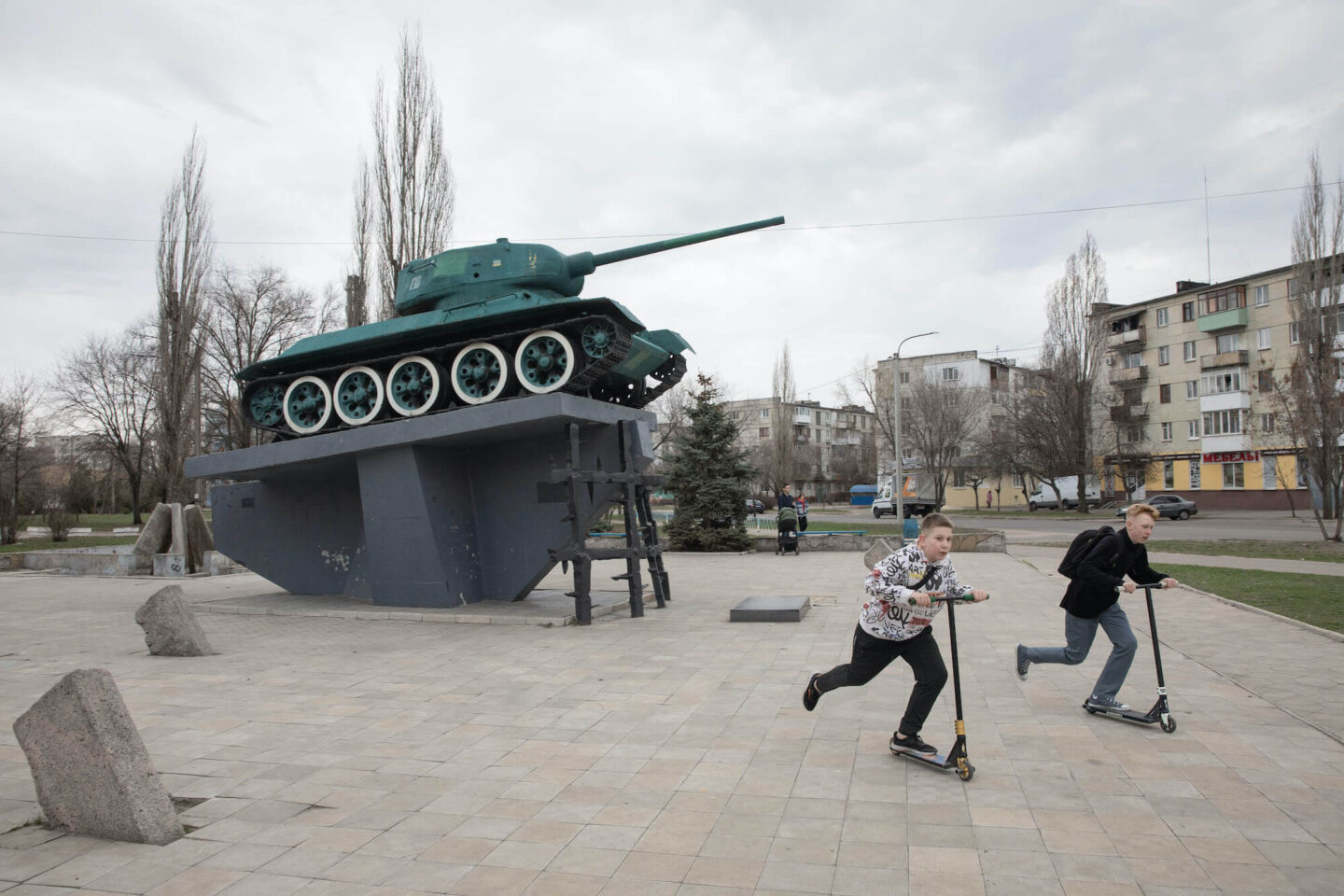Marci Shore, a historian, is known in Ukraine first as the author of the book about the Revolution of Dignity “The Ukrainian Night: An Intimate History of Revolution.” Shore, a professor at Yale University, studies history of ideas in Central and Eastern Europe, the history of literary and political interaction between Marxism and phenomenology.
We talk with the professor during the security forum in Kyiv in spring 2024, of which she is a participant, and return to the topic of Maidan as the key subject of the modern Ukrainian history.
Last time, we spoke with you in summer 2022. Specifically, we talked about whether it felt safe enough to travel to Ukraine. It seems we got to the point that no, it didn’t feel too safe. Now, it’s the end of March 2024, and you are in Kyiv. How do you feel now? How does it feel—to travel to Ukraine during the war?
It worries me greatly. I am nervous, but I am always nervous if I travel without my kids. I still get anxious when separated from them, although they are eleven and thirteen—they are already grown-ups. But I am also nervous even if I don’t sleep at home for a night or two. Now, I am away from home for as long as ten days—I’ve never parted with my kids for so long.
It’s impossible to conduct research with a control sample on your own life, so I don’t know how much of the stress is related to my children, and how much takes its roots in my coming to Ukraine. My thirteen-year-old son told me: “Mom, we won’t die. Please, don’t you die, too.”
Children know that I felt better after arriving in Ukraine, so I had been more stressed on my way, before I came here.
Why?
Because a lot of anxiety was caused by anticipating something unknown. In Ukraine, I feel so happy, I am glad to be here. I am grateful for being able to come back here, for the city that has not fallen, that is standing.
I always say that the invasion started on February 23, 2022—because at that time in the USA, in New Haven, where I live, these were still late hours of February 23. I watched the news and thought it was something insane.
But the city is standing, it is here. You are here. My friends are here.
What has changed in the meantime?
For instance, I feel that people drink less alcohol. This remark is not only about Ukraine, but in general, when I visit Europe, I see that people drink more here because the culture of alcohol is different than in the United States.
People got used to the war: not in the sense of ignoring it, but in the sense of psychological acceptance. For example, everyone has gotten used to air alarms and shelters. And people know whether they should rush to the shelter, or they still have some spare thirty minutes. By the way, I was impressed by the shelter in Kyiv school of economy—it is so diligently done, these are real classrooms with all the equipment for studying online here, and there is water, and food supplies, even a shower, and a generator here.
Everything speaks of being prepared. Everything is as my coach Mario says: “It’s impossible to be ready for everything, but it’s possible to be prepared”.
I am amazed by a paradox: in Ukrainians, you can feel both their refusal to acknowledge that the war will last long, and their readiness to fight till the end.
How has Kyiv changed?
Now I am ashamed to speak Russian here. It means only English is left for me. At the same time, I am ashamed to speak English, too, as I feel like an American imperialist—one of those awful Americans who expect everyone must adapt to them and speak English. For my whole adult life, I have tried not to be that person.
Since the early 1990s, I have been visiting countries of the former communist part of Europe, always struggling to be the person who learns the local language and doesn’t expect everyone to speak English. But I have not learned Ukrainian yet, alas. Though now in Kyiv, even if I say something in Russian, everyone replies in Ukrainian. I understand a bit, I am trying to adapt, but my language skills are rather limited. From time to time, I try to speak Ukrainian, but it soon turns into the mixture of various Slavic languages I have been studying at some point in my life.
In 2002, during my first visit to Kyiv, it was completely different. It seemed everyone, without any exception, spoke only Russian.
It felt surreal because all the shop signs, restaurant menus etc. were in Ukrainian. So, there was a gap between what you could see and what you could hear. I remember how in one of the restaurants twenty years ago the waiter effortlessly translated the menu from Ukrainian into Russian so I could understand it. At the time, the language was not a sensitive subject—neither politically, nor emotionally. People just switched between the two languages.
Next time, I came to Kyiv with Tim (Timothy Snyder). I believe it was in 2005. We were a grotesque American couple, because he spoke Ukrainian, and I spoke Russian. Our interlocutors, seeing our limited language skills, were willing to switch the languages dozens of times, and repeat everything for us with Tim—first in Ukrainian, and then in Russian. Everyone did it with no effort at all. You could expect it from a philosopher or a scholar, but drivers or waiters didn’t have any difficulties with that, either. During that visit, again, I didn’t feel that the language, the choice of language was something sensitive. At the time, it seemed like a practical, pragmatic choice.
Today, it’s far from that.
But I was amazed by something else, apart from the language. It was a deep feeling of regret, sadness, mourning. I felt it when I was in Lviv. On that morning, I visited the Lychakiv cemetery, and I saw how many fresh graves there were. And I thought, how quickly the cemetery was growing.

Let’s talk about Euromaidan. Ten years have already passed since then. In your opinion, what is our legacy from that experience?
I’d love to know more from you on this topic.
But let’s talk specifically about your thoughts on it, as a historian.
A new edition of my book about Maidan “The Ukrainian night” is just being published, and it has a new foreword, where I continue the story, adding the war context. One of the things I mention in the new foreword is the long history of Russian imperialism, and its influence on the continuity of the Ukrainian nation. But also, I would like to return to Maidan as a starting point.
There is some irony here, as I am a history researcher, which means I should strive for infinite distance in time. As everything that is happening is caused by something that has already happened before, which unlocks the possibility to continually move further back in time, the possibility of constant regression.
However, for me, Maidan is unique as a starting point. It is peculiar in a way that Hannah Arendt wrote about the moment of birth of something new,—it was a miracle. This revolution turned out to be not only a political term, but an existential transformation.
Maidan is the first revolution that happened during my life. For me as a historian, it is no less than phenomenal that I could witness it in real time.
I mean it in the same way as Arendt wrote about it,—as about the lost treasure. Beyond “victory” or “loss”, it is all about the thing in itself—it is, once again, about the miracle. Maidan reminded us that such things are generally possible.
I must notice, that during Maidan I was in Vienna. That is, I saw it through the eyes of an American woman who looks at the events in Ukraine through the German-speaking media’s interpretation. Generally, I watched the events in all languages accessible for me—Russian, German, and English, of course. Still, the most meaningful coverage of the Maidan events was the one in Polish. It seemed Poland could really understand what was going on,—and it was not empathy, but specifically understanding.
How do you explain that?
Because in Poland, there are still the “Solidarność” veterans. They remember there what such protests look like, how they gather workers and intellectuals, Jews and Catholics, parents and children together. They know better than anyone else, that that mutual solidarity lasted no longer than some twenty seconds after the USSR collapsed. And they also know it was a miracle—one of those that most people were not destined to experience in their life.
It does not mean they were not idealists. They were. They just did not count on everyone living happily ever after. But they already knew what kind of miracle they were capable of. This realization fosters hope and faith in humanity, that it is capable of something better. I think people feel something similar when they have children. They must feel it. If there was no such hope, how would they justify having children at all?
I remember very clearly the conversations in 2019, after the presidential elections. Discussions on whether Maidan lost or won. As a historian, what do you think? Was Maidan a victory?
I think, revolution is revolution. It is a treasure, a miracle, something beyond the definitions of victory of loss.
Revolution changes people, too. People on Maidan are not the same people they’ve become after Maidan. Society changes after Maidan, too. Behavior, attitudes toward democracy, responsibility, and civil duties are changing.
From this perspective, I believe the revolution was a success—Ukrainian society has changed. I would like to cite here a Facebook post from February 24, 2022: Russians do not get it they are now dealing with a different Ukraine than ten years ago.
Do you know what amazed me the most on Maidan? On November 21, 2013, when students came to Maidan, it did not seem at all that anybody was going to die there. But in January 2014, it was already obvious that a critical mass of people gathered on Maidan and decided that they were ready to die here if they had to.

These people could have stood their ground for the first time near St. Michael’s Cathedral on December 1, after the beating of students.
Yes, it was an obvious change—it happened when the students were beaten. Probably, Yanukovych thought that the parents would come and take their children away from Maidan. But the opposite happened: parents joined their children. Parents and children stood side by side. I was stunned by that. Usually, revolution is also an uprising of the younger generation against the older one—this is a classic trope of revolution.
And then, the war broke out. It is now ten years old. I would like to ask you about your vision of difference between the war of 2014 and the war of February 2022.
I have an impression that in 2014 there were more chances for differentiation. At that time, at the end of 2015, I was amazed one could live in Ukraine and did not feel the war was going on in the other part of the country. I mean, at night you could go to some jazz festival, where people were totally unaware of the war. In Dnipro, the feeling was less intensive, but in Lviv it was stronger.
I am quite a coward, that’s why I’ve never visited either Donbas or the front. But, working on my book, I felt I had to be closer. Thus, in 2015 I went to Dnipro. There, I talked to many people, who were always on the move,—somebody was going to Donbas, others were returning from there.
At that time, I received messages from my friends, who wondered how I could have gone somewhere so dangerous. But Dnipro was not a dangerous city in 2015. There was just a feeling that there was a war somewhere there, and there was a line, a border, and everyone knew where it was. Yes, it was dangerous to cross that line, but there was no impression the war could spread to Dnipro any minute. There was no feeling that a bombing was about to start, or that an air alarm was about to sound.
Meanwhile, now even Lviv does not feel safe. For example, one of the hits in Lviv in March 2024 happened just a few hours after I had left the city. Today, the threat can be felt anywhere. It can happen anywhere, at any time. There are no safe places anymore. You can no longer feel the war is going on somewhere else.
I can also compare Putin’s speeches in 2014 and in 2022. In 2014, in his speech, he looks like a sly person, who had calculated everything, who kept everything under control—it seemed like everything had been played out in terms of political technologies according to a pre-prepared scenario. In February 2022, his speech before the start of the invasion was entirely different. If eight years before he could look like a chess grandmaster, now he was more like Shakespearean Macbeth, like an aging man who, realizing his own mortality, decided to blow up the whole world.
2014, with the illegal annexation of Crimea, resembled early 1938. But it may be my historical interest speaking here, and the fact that I have been studying the 1930s for so long.
It was all akin to the Sudetenland, Chamberlain’s words to students about a war in a distant country between peoples of whom we know almost nothing… However, at the time, there was no feeling that everything could explode at any moment.
It seems that sometimes people talk about the full-scale invasion as if it were World War III. Do you think it has already started? Or are these just the first signs of the future world war? It is like two sides of the same coin. Do you share any of them?
Yes. It is already World War III. It seems we are already in the midst of war, without us realizing it. This is a rather Hegelian idea: we understand and realize only when we look back. My big fear is whether we are all approaching a great explosion, after which everything will calm down, or everything can still be put to a halt.
Every day, I tear my hair our, wondering why everything is moving so slowly. Why we give just two tanks, and not three, why we give only fifty of those rockets, instead of more. I wonder: is it not obvious what is really happening? Is it not clear the time has come to give everything needed just to stop it?
This situation resembles 1945. Everything will come to an end only if the Putin regime is completely destroyed and everything starts over. In 1945, no one negotiated with Hitler. No one said that it was possible to leave a part of the European Jewish population under occupation, no one said that some people could simply be killed. Vice versa—everyone knew the whole regime should collapse, without any other options. Why can’t the world see this?
I remember in summer 2022, we talked about the narrative of the end of history, which had come to its end at least in 2022, if not already in 2014. How do you feel it now?
I don’t think the idea itself was a bad one. The danger in it was rather that we became too complacent.
Like, it is clear anyway, that all other options have been exhausted, and they all lead to tyranny, so sooner or later everyone turns to democracy. Looking from this perspective, there could not have been a war in Yugoslavia. But exceptions like this were treated more like road bumps—like, there will be road bumps, but we will finally get to the correct point of destination.
So, we became too complacent, we didn’t work hard enough. I mean the so-called “collective West”, where people did not realize properly how frightening the 1990s had been in Eastern Europe. People did not understand all the suffering the capitalism had brought, which at that time resembled more the XIX-century capitalism, i.e. the one where everyone could exploit everyone without any limits.
For some reason, the West assumed everything would somehow work itself out, and everyone would naturally take the right place.
It was a dangerous way of thinking. Never in history has the momentum happened naturally. It is always about people who make some choice and must take responsibility for it. It is about some combination of good fortune, human choice and historical structures.
We cannot count on the guaranteed happy end. Narration about the end of history ends here, in Ukraine.
Today, this is where the centre is located—the history unfolds here, both physically and intellectually. I feel that this is where the cutting edge of thinking is, where we must reconsider everything. Here, everything will become clear, whether the world will survive, whether neo-totalitarianism will take over everything, whether nuclear war will destroy everything.
That’s why it’s so hard for me to take my attention away from Ukraine. You just feel you want to be here, as something important is happening here. I think that today Ukraine is the most important place in the world, where our future is being defined.

If not the concept of the “end of history,” then what after it?
I have no idea. With some idealism, I hope the world is moving towards the stronger feeling of responsibility. After all, I study intellectual history, so I work with ideas, even with those that have been pushed out of physical reality.
For me, Maidan was an act of demanding subjectivity—that is, demanding responsibility, gaining responsibility. It is hard to explain in English, as we do not have this differentiation, as we only have one word—”subjectivity”. Whereas, for example, in Polish there is “subiektywność” and “podmiotowość”. It is about distinguishing between what it means to be a passive object and what it means to be an active subject. Subjectivity is always about responsibility.
Responsibility was a key concept of dissidents in 1970s and 1980s in Eastern Europe. It was the whole philosophy that united subjectivity, truth and responsibility. This concept was forgotten in the 1990s, when everyone got interested in free market economy, neoliberalism, and moving towards liberal democracy.
I think it is time to come back to the idea of subjectivity, truth and responsibility. If the world is to survive at all, there are no other options but responsibility. We cannot avoid the fact that we are the ones who build the world every day. I believe Ukraine is proving it best with its own example.
I’d like to ask you about your course on European intellectual history. Is there a place in this course for Ukrainian thinkers or philosophers?
There are so many thinkers I’d love to add to my course. It mostly includes “the usual suspects”—usual for this kind of course. However, at my seminars I worked a lot with Ukrainian texts. My students and I read Zhadan, Rafieyenko, and we definitely read texts by Victoria Amelina…
This semester I am teaching a course on the war in Ukraine and the problem of evil. We read a lot of Ukrainian authors in it. I think that Ukrainian texts comprise the biggest part of the course.
Today, a lot of Ukrainian texts are being translated. Thus, it was so interesting to work with the translation of the book by Stanislav Asieyev “The Bright Path: The Story of Concentration Camp”. In one of the chapters, the author writes about the view of another. About what it means to look at a person who is torturing you,—to see the reflected look of this person. It seems to have been the touchiest of all the texts we read. To put it in a nutshell, it is a brilliant book.
We met with Stanislav at a podium discussion dedicated to his book being published in the USA. I looked at him and thought that he was so young he could be one of my students. The things he writes about, should not have happened to him…I think, “The Bright Path” will become classics. As a student myself, I was completely absorbed in the pages about the Holocaust and the Gulag. It seemed to me it was important to understand the terror and experiences of suffering. That’s why I read all those memoirs and narratives. But it was much harder to read Stanislav’s book, as the events described there are recent—they seem to have happened just yesterday. In his narrative, there is no such distance as in stories about the 1930s and 1940s. It all took place in the 21st century, but it is something that should never have happened.
You said that without understanding Ukraine today, it is impossible to understand the world. What specifically is important to understand about Ukraine in order to understand the world?
First, it is the realization of the fact that we live in a highly interconnected world. Now—even more than at any point before. I mean primarily the intellectual dimension, where Ukraine is indeed its centre.
Second, that freedom is valued in Ukraine. The whole society has grown and changed here and has turned into a critical mass of people ready to take on the responsibility. In Ukraine, a society of people has grown up who refuse to live under neo-totalitarianism and who have learned to distinguish between Good and Evil.
It is interesting why for so long so many people have completely ignored the Ukrainian contexts. It seems that some of them only realized on February 24, 2022, that Ukraine exists at all, and there are interesting things here that are worth sharing with the world.
It is true. At the same time, national peculiarities should be considered. For example, Americans generally tend to forget there is the rest of the world at all.
But in ten years, truly major changes have taken place. Ten years ago, when I spoke about Maidan, about the war in Donbas, the interest was not strong. Meanwhile, there was a high number of people who could think it was all about right-wing nationalists, so, why should we get involved with that? These people did not support Putin, but not everything was clear and understandable to them.

Today, it is changing. Personal experience of those who visited Ukraine, means a lot, too. We all felt it very quickly, because after the full-scale invasion had begun, not only did journalists start asking for comments more often, but they also started asking much better questions. They were no longer looking for short comments, but they were ready to talk for forty minutes straight, listening carefully to our explanations, delving into the context.
It is understandable, as it is impossible to be equally well-informed about everything in the world. I believe that this time, the American media treat the Ukrainian topic much better than previously.
Translation — Marta Gosovska
§§§
[The translation of this publication was compiled with the support of the European Union and the International Renaissance Foundation within the framework “European Renaissance of Ukraine” project. Its content is the exclusive responsibility of the authors and does not necessarily reflect the views of the European Union and the International Renaissance Foundation]





